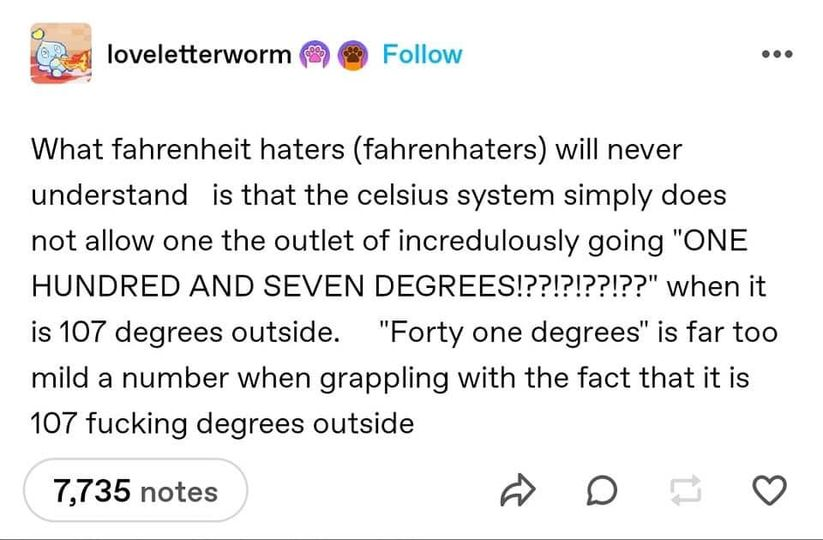this post was submitted on 09 Sep 2024
1235 points (92.4% liked)
Science Memes
10950 readers
2074 users here now
Welcome to c/science_memes @ Mander.xyz!
A place for majestic STEMLORD peacocking, as well as memes about the realities of working in a lab.

Rules
- Don't throw mud. Behave like an intellectual and remember the human.
- Keep it rooted (on topic).
- No spam.
- Infographics welcome, get schooled.
This is a science community. We use the Dawkins definition of meme.
Research Committee
Other Mander Communities
Science and Research
Biology and Life Sciences
- [email protected]
- [email protected]
- [email protected]
- [email protected]
- [email protected]
- [email protected]
- [email protected]
- [email protected]
- [email protected]
- [email protected]
- [email protected]
- [email protected]
- [email protected]
- [email protected]
- [email protected]
- [email protected]
- [email protected]
- [email protected]
- [email protected]
- [email protected]
- [email protected]
- [email protected]
- [email protected]
- [email protected]
- !reptiles and [email protected]
Physical Sciences
- [email protected]
- [email protected]
- [email protected]
- [email protected]
- [email protected]
- [email protected]
- [email protected]
- [email protected]
- [email protected]
Humanities and Social Sciences
Practical and Applied Sciences
- !exercise-and [email protected]
- [email protected]
- !self [email protected]
- [email protected]
- [email protected]
- [email protected]
Memes
Miscellaneous
founded 2 years ago
MODERATORS
you are viewing a single comment's thread
view the rest of the comments
view the rest of the comments

But really it is much better for human temperatures.
It's just intuitive, 0F is 100% cold, and 100F is 100% hot.
When the dry bulb gets above 100F, wind only cools you down by sweat evaporation, and when the wet bulb gets above 100F, even that can't cool you down, and you will die if you don't get to a cooler or drier environment.
How is 0F 100% cold though, most places will never get that cold, so it surely makes more sense to have 0F at freezing point of water and 100F at 38C?
Freezing point of pure water - but saltwater/brine freezes as a different temperature.
pure water at mean atmosphere pressure at sea level if we're getting technical, but frankly human body temperature varies from 35.5C (95.9F) to 37.5C (99.5F) anyway, and that's before considering when people are ill, so if we go down that route it falls apart quickly enough that the definition of 100 given above is clearly just as arbitrary
I'm okay with "mean atmosphere pressure" bc that's what is most likely to occur, whereas pure water seems far less likely to be found in a coastal village. The oddness of the measuring abilities of the devices made at the time is a more damning argument, but less for them back then and more for us now. Still, roughly negative ten to 40 for Celsius vs. roughly zero to one hundred for Fahrenheit, the latter does seem to use more "natural" numbers, even if nothing else about non-metric systems makes any sense.